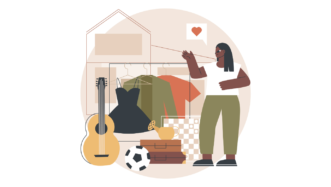LESSON OVERVIEW
In this lesson students learn and practise vocabulary related to cars and driving, watch a funny video and do reading comprehension tasks. They also talk about getting a driving licence in their countries.
This is a Flipped Classroom lesson plan. In a nutshell, it means that the first part of the lesson needs to be done by students at home. Learn more about flipped classroom and how we implement it in these lesson plans in our post.
PRE-CLASS ACTIVITIES
Vocabulary
In the pre-class part of the video, students do three vocabulary tasks. First, they label parts of a car in the pictures with words from a list (e.g. clutch pedal, boot, steering wheel). Some of the British words are listed with their American counterparts. Then, they complete collocations related to driving (e.g. practical test). Finally, they choose correct words to complete sentences about driving and driving laws (e.g. fasten your seatbelt, parallel parking). The vocabulary learned at home will be used in the in-class part of the lesson.
IN-CLASS ACTIVITIES
Video and reading comprehension tasks
In the classroom, students start by discussing some driving laws with those in their country (e.g. speed limits, overtaking, driver’s age, etc.). Before watching the video, students explain how one gets a driving licence in their country and how the people who take the driving test feel. Then, students watch the video about an unusual driving test and summarize what happened. After that, they read a funny text about a person taking a driving test multiple times, and do two reading comprehension tasks. In the first one they have to find the significance in six numbers which appear in the text. In the second one, they look at the text again and find things which are similar and different about getting a driving licence in their country. Finally, students discuss questions about driving and share some driving tips. If a student is not a driver, the questions can be adapted. Some examples of that are provided in a teacher’s note.
Subscribe to unlock these and many other Standalone lesson lesson plans with the Unlimited planWORKSHEETS













Why is it “Did you pass first time,” instead of “Did you pass THE first time?” Is it a difference between British and American English? Thank you!
Hi there! Actually, both forms are OK and it’s more of a formal/informal language distinction rather than Br/Am English. It’s quite common in informal language to drop the definite article when there’s no ambiguity over whether it would be a or the (there’s only ever one first time after all). It would still always need the if at the start of a sentence though.
Thank you!
Thanks for this great lesson. Very practical and fun!
One minor mistake on slide 8: Luckily, I have never had to do an emergency.
It should read: I have never had to do an emergency STOP.
Keep these engaging lessons coming!
Peter
Thanks for the comment! The word ‘stop’ was crossed out and of course it shouldn’t be like that. We’ve just fixed that.
I’ve used this lesson a few times and it was great for speaking and vocabulary! Lots of opportunities for sharing personal experience and opinions.
One thing I’d like to bring attention to is that driving and (not) having a driver’s license might be a potentially sensitive topic for some. Some people may have been involved in serious car accidents (as a passenger, driver, or witness) and/or lost their license, and this might come up during the discussion.
We’re happy to hear that the lesson was successful with your students! Thanks for sharing your thoughts. It’s actually very important to always bear in mind that students might have various experiences and they either want to share them or feel uncomfortable doing that.
Nice lesson, but I feel the video could have been better explored, with comprehension questions or discussion questions, not just to ask students to summarize the video. This would give the video a purpose for being in the middle of the lesson. I’ve had to prepare some extra questions and activities for it.
Thank you for taking the time to share your feedback with us! The video is quite short and we feel that comprehension questions might not work here so that’s why we just ask students to summarize it. However, giving students some discussion questions might be a good idea if you want to extend the listening part of the lesson.